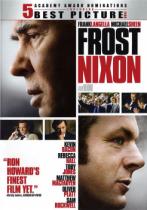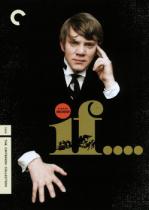Members
Stats
Users Online Users: 0 Users: 0 Guests: 99 Guests: 99 Total: 99 Total: 99 |
if.... , a review by AchimStars: Malcolm McDowell as Mick David Wood as Johnny Richard Warwick as Wallace Christine Noonan as The Girl Rupert Webster as Bobby Phillips Plot: Lindsay Anderson's If.... is a daringly anarchic vision of British society, set in a boarding school in late-sixties England. Before Kubrick made Malcom McDowell's mischief iconic in A Clockwork Orange, the actor made a hell of an impression as insouciant Mick Travis, who, along with his school chums, trumps authority at every turn, finally emerging as violent savior against the draconian games of one-upmanship played by both students and the powers-that-be. Mixing color and black and white as audaciously as it mixes fantasy and reality, If.... remains one of cinema's most unforgettable rebel yells. Extras:
My Thoughts: My personal guess is, that this is actually a fairly accurate portrayal of life at a boarding school in 1968. With a class system firmly in place, things can get pretty rough for those on the lower levels being oppressed by "the upper class".Travis' transformation from small rebellious behaviour to revolution is very well performed by Malcolm MacDowell and it's easy to see why Kubrick found his Alex for Clockwork Orange in this. The acting in general is good, including the younger cast members playing the "freshmen". It was a bit strange that in the beginning to other characters are set up very prominently, new student Jute and a new teacher, yet nothing really comes from this and the film only shows them on occasion during the second half  The obvious political subtext is mostly lost on me, as it is apparently very British, maybe more relevant for the time it plays in, and I have never been interested in politics much. I am not sure what you'd call it (farce, satire...?) but especially at the end they completely go over the top with the final confrontation of the film (in a good way  ). Beyond this the film also shows latent homosexuality as being present (it's an all-boy boarding school...) and at one point a teacher clearly touches one of the boys in a slightly inappropriate way; these topics are touched on but not made topic. ). Beyond this the film also shows latent homosexuality as being present (it's an all-boy boarding school...) and at one point a teacher clearly touches one of the boys in a slightly inappropriate way; these topics are touched on but not made topic.I could never quite figure out what the use of black and white represents. It seems a bit inconsistent to me, as every time I thought I figured it out another scene would come up that "should have been" black and white but wasn't. Unless somebody can tell me, I may have to try the commentary for this. Here is the link to Wikipedia for further information. It was here that I saw that apparently two sequels were made: O Lucky Man! (1973) Britannia Hospital (1982) Rating:  EDIT: As commented by Dave and also mentioned in the special features of the DVD, the use of black and white was actually rather random and initially based on an economic decision (the lighting of the church was cheaper for black and white than it would have been for color). As for the political subtext, I was apparently spot on in that it was a comment on the British class system. The film also happened to coincide with the student revolts in France and other countries, which gave it an eerie actuality at the time. (From The Movies from Within My Lifetime on July 4th, 2011) Frost / Nixon, a review by Rich Title: Frost / Nixon Runtime:123 Certificate:R Year:2008 Genres:Drama Plot:My Review: Fascinating insight into an historical moment, I had watched the last interview before on TV, and this film fills in all the gaps of the hows and whys surrounding the final admission by Nixon in his interview with Frost, and some superb acting brings the whole piece to life. I went into the film with low expectations, but under Howards unfussy direction the 70's feel, the political turmoil of the times, and the drama of the final piece were totally authentic and absorbing. The performances are perfectly understated, Michael Sheen again proves to be one of todays brightest and most versatile performers, but the movie is dominated by Frank Langellas wonderful depiction of Nixon. 400 million people watched the final interview worldwide, a remarkable achievement by Frost against so many barriers and financial blocks, and after this movie my dislike of him has turned into respect. A perfect balance of political intrigue, tension, drama and humour. My Rating  (From DCO third annual November Alphabet Marathon - discussion/review/banter thread on November 6th, 2009) "Stargate SG-1" Marathon, a review by DJ DoenaDisc 2 Learning Curve Synopsis: On a planet that seems to be a descendant culture of the Aztecs, SG-1 meets children that are very eager to learn. A girl at eleven years explains to Sam how the Naqahdah reactor works that she has designed. Another boy wants to learn everything about the culture and the battle tactics of the Goa'uld from Teal'c. But the future of these children is rather gloomy.My Opinion: In my opinion "Clash of Cultures" is the right term here. The Orbanians are no "bad guys", they have just another way of living than we do. I still liked the fact that Jack followed his heart again. Point of View Synopsis: After Earth has been overrun by the Goa'uld, Sam and Major Kawalski have to escape through the dimension mirror - into our world - and they ask for asylum. Suddenly there are two Sams and that leads to unexpected side-effects.My Opinion: Jack & Sam. I like it when they hint to that possibility during the run of the series but never actually realize it due to the rules set by the US military. The toying with alternate realities is always interesting, as it is this time. I also liked that they kept Teal'c's face in the shadows to not to spoil the gag. BTW: The beards of Apophis and Teal'c were a reference of the producers to Spock's beard in the mirror universe. Deadman Switch Synopsis: SG-1 is caught by a bounty hunter who wants to trade them to the System Lord Sokar. But he offers them a deal: If they help him to catch the Goa'uld Kel'tar they are free to go. But Kel'tar isn't who he seems to be.My Opinion: Sam J. Jones (Flash Gordon, The Highwayman) may not be a good actor but I like him anyway. He has a dry from of humour that I like. When the transport ship (Tel'tak) decloaked I felt strongly reminded of the first time a holodeck door opened in the middle of a landscape. I still like this effect very much. Demons Synopsis: In a village that seems to be based on a middle ages christian society is a woman that is to be sacrificed to a demon. She is supsected to be possessed but is just ill. SG-1 prevents the sacrifice but subsequently gets into trouble. The word demon is not randomly chosen this time: The Demon is an Unas in service of Sokar.My Opinion: I am very bad at recognizing faces, if I haven't seen someone several times I don't recognize him/her. But in the moment I saw Simon I knew it's the same actor as the prosecutor in Cor-ai and I was right: both were played by David McNally. As for the episode: I didn't like it that much because I didn't like the explanation of how a middle ages christian society can be found on another planet. (From "Stargate SG-1" Marathon on March 16th, 2008) |



 May 14, 2024, 07:29:59 AM
May 14, 2024, 07:29:59 AM

